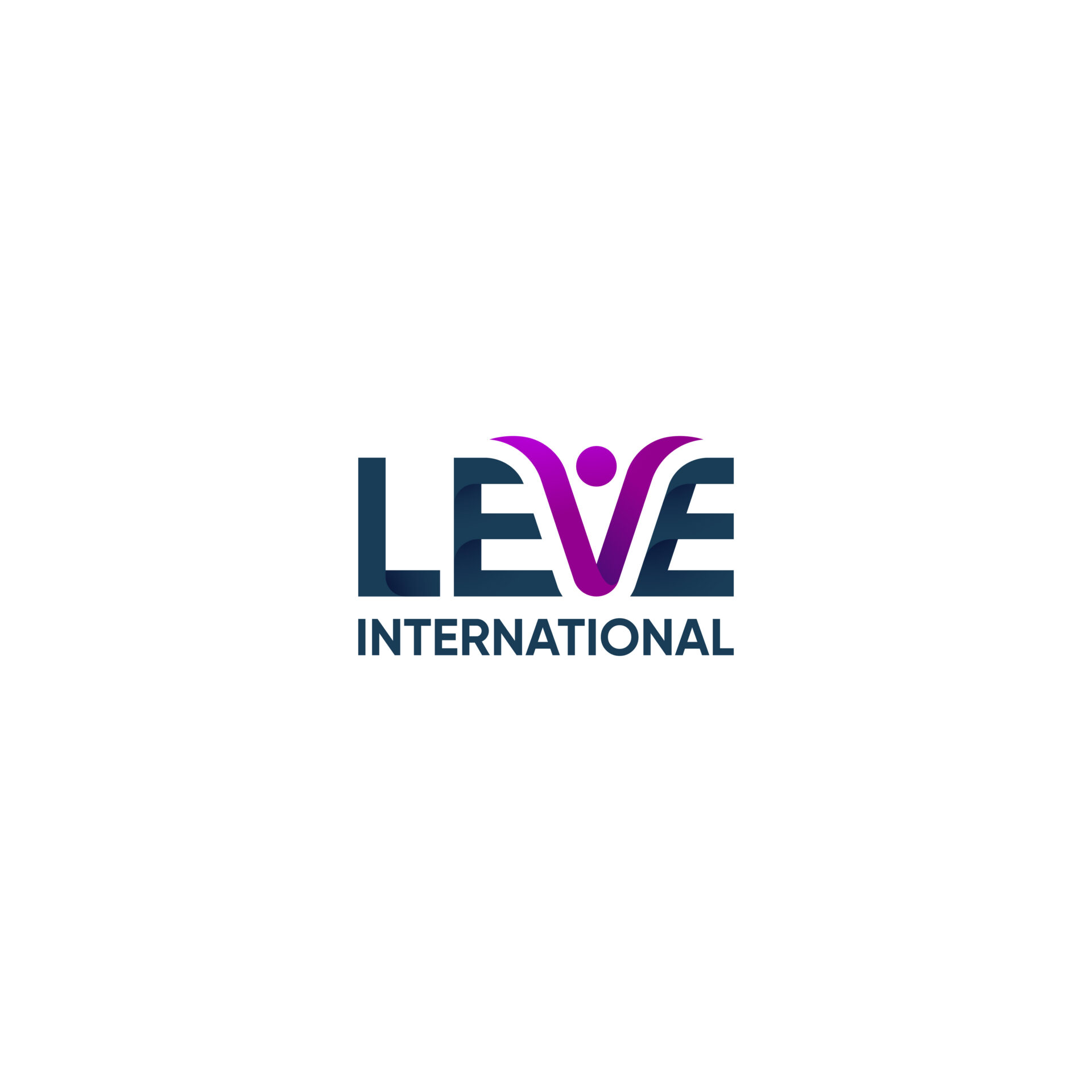LEVE INTERNATIONAL has initiated a sustainable farm program prototype to help rural Haitian farmers overcome numerous obstacles in agriculture and make farming a profitable business. Haitian farmers face several challenges, including the absence of irrigation systems, which forces them to plant only during the rainy season, reducing their ability to increase yields. Fencing is also lacking on farms, leaving crops vulnerable to damage by animals, and farmers often lack access to quality seeds, reducing competitiveness and yields. Additionally, farmers do not have access to capital and are not subsidized by the government, leading to subsistence farming practices.
The high cost of feeding is a major challenge for the farming sector, making farming less competitive for Haitian farmers. The lack of innovation and creativity in finding strategies to lower production costs contributes to this issue. The sustainable farm program prototype aims to address these challenges and create more sustainable and profitable farming practices for Haitian farmers.
By implementing irrigation systems and providing access to quality seeds, the program aims to increase yields and competitiveness. The program also includes fencing to protect crops and access to capital to help farmers invest in their farms. Through these initiatives, the program aims to move away from subsistence farming and towards a profitable business venture for farmers.
The sustainable farm program prototype is an innovative approach to addressing the challenges faced by Haitian farmers. By creating sustainable and profitable farming practices, the program has the potential to increase food security, reduce poverty, and create economic opportunities in rural areas. However, the success of the program will depend on its implementation and the support of government and local communities.
Haiti is heavily dependent on imported agricultural products to meet domestic demand. The country imports 40 million eggs per month from the Dominican Republic, and the United States is the largest supplier of wheat, corn, sorghum, millet, and rice. The country's inability to produce enough food domestically presents an untapped market in the agri-business sector in Haiti.
LEVE INTERNATIONAL, a non-profit organization, has initiated prototype projects in the field of regenerative agriculture and aquaponic farming to encourage farmers to build community partnerships and allow investor to fund their farming businesses.
The organization has established the feasibility of regenerative farming in Hinche, where it purchased land and fenced it to allow livestock to free-range. It has also established the feasibility of a hydroponic system and is currently working to build an aquaponic food production system.
LEVE INTERNATIONAL plans to scale these successful prototypes by establishing an agriculture research and training facility in partnership with local farmers in the four section communales in Hinche. The organization believes that building community partnerships and leveraging the economic power of the Haitian diaspora to invest in farming businesses can help to reduce the country's dependence on imported agricultural products.
Cereal products, especially wheat and flour, are major components of the Haitian diet. However, the country does not produce sufficient grains to satisfy domestic demand. In addition, Haiti imported $150 million worth of meat and edible meat offal during CY2021, a 39.5 percent increase compared to CY2020, according to the website of the international trade administration.
Investing in the agri-business sector in Haiti could create job opportunities and help to reduce the country's dependence on imported agricultural products. LEVE INTERNATIONAL's prototype projects in regenerative agriculture and aquaponic farming are a step towards building a sustainable agricultural industry in the country.
LEVE INTERNATIONAL, a team of effective leaders in Hinche, Haiti, has made significant advancements in their program. The team has built a profitable restaurant business generating a gross profit of 55% and implemented several projects with high ethical standards. They have also established community development units in the first section communale, providing agricultural tools to local farmers, and have built a farm in Hinche, raising chickens, pigs, cows, goats, ducks, and turkeys. The team collects organic waste for the local markets and restaurants to feed the animals. LEVE INTERNATIONAL has a large base of support among local farmers, and Hinche enjoys stability compared to other cities in Haiti.
LEVE INTERNATIONAL faces challenges, including the lack of funding to attract local talents and the absence of effective poultry breeds with a low feeding to egg conversion ratio. However, there is an opportunity to scale up successful prototype projects and invest in research and development to find innovative ways to lower production costs and make farming and agriculture an attractive occupation and business venture in Haiti.
The major threat facing LEVE INTERNATIONAL is the insecurity and violence in Port-au-Prince, but Hinche has access to Cap Haitian and is located close to the Dominican Republic border. With more funding, LEVE INTERNATIONAL can continue to partner with effective local teams and farmers, leveraging their strengths and expertise to overcome challenges and build a sustainable future for agriculture in Haiti.
he primary funding strategy of the organization is to generate revenue through their recently launched restaurant businesses in Hinche, beginning in July 2022. However, it is expected that it would take approximately two years for the restaurants to generate $70,000 in revenue. As Hinche is currently experiencing peace and stability, the organization intends to capitalize on this opportunity by applying for grants from multiple international foundations.
The organization aims to use the two-year period to seek grants while they wait for the restaurants to generate revenue. The grants will serve as an additional source of funding to support their programs and activities. This funding strategy enables the organization to maximize the current peaceful and stable environment in Hinche and make the most of the opportunity presented.
In summary, the organization's primary funding strategy is to generate revenue from their restaurant businesses, while applying for grants from various international foundations to support their programs and activities. The two-year period provides a window of opportunity for the organization to secure additional funding while waiting for the restaurants to generate revenue.
Strengths:
- Sustainable farming practices can lead to long-term environmental benefits such as soil regeneration, biodiversity preservation, and reduced use of harmful chemicals.
- Sustainable farming can also lead to healthier and more nutritious crops, which can potentially yield higher profits for farmers.
- The program has a team of experts in sustainable farming practices who can provide training and support to farmers.
- The program has partnerships with local farmers, cooperatives, and other organizations, providing a network of support for the program.
Weaknesses:
- Farmers may initially resist the adoption of sustainable farming practices due to lack of knowledge, resources, or resistance to change.
- The cost of implementing sustainable farming practices may be higher than conventional farming methods, which can make it difficult for farmers to invest in the necessary changes.
- There may be a lack of infrastructure or access to resources, such as water or electricity, that are needed for sustainable farming practices to be successful.
- The program may face competition from other farming programs or businesses that prioritize conventional farming methods over sustainable practices.
Opportunities:
- Growing consumer demand for sustainably produced food can create new markets for farmers who adopt sustainable farming practices.
- The program can partner with other organizations, such as government agencies or non-profits, to access additional funding or resources to support sustainable farming.
- There may be opportunities to develop new technologies or farming methods that can further improve the sustainability of the program.
- The program can provide a model for other communities or regions to adopt sustainable farming practices, potentially leading to widespread adoption.
Threats:
- Changes in government policies or economic conditions can affect the viability of the program or the demand for sustainably produced food.
- Natural disasters, such as droughts or floods, can impact the success of the program by damaging crops or infrastructure.
- The program may face competition from other organizations or businesses that offer similar sustainable farming programs.
- Negative perceptions or misunderstandings about sustainable farming practices could create resistance among consumers or farmers.
To stay updated on the latest news about the sustainable farming business in Hinche, you should follow our blogs. We also offer various volunteering opportunities, such as mentoring the team, sharing your knowledge, or making a monthly contribution.
Our timeline
Land purchased
July 2021
(Hinche, Haiti)
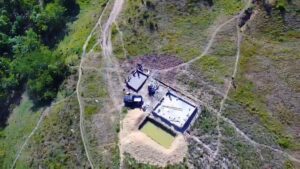
Chicken coop built
December 2022
( Hinche, Haiti)
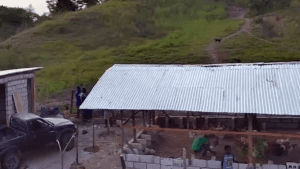
Soil regenerated
By July 2022
(Hinche, Haiti)
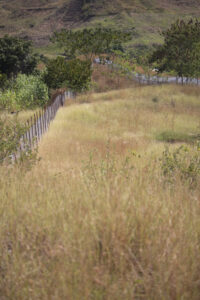
HL-Farm soil is regenerated
Farm fenced
By April 2022
(Hinche, Haiti)
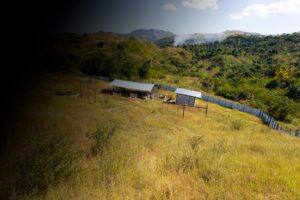
Picture of the farm business (Hinche,Haiti)
Regenerative farming started
By July 2022 we purchase several livestocks to evaluate and study their reproductive behabior
- Pigs
- Cows
- Ducks
- Chickens
- Goats
- Turkey
Join our team
This for allow volunteers to join our different teams
